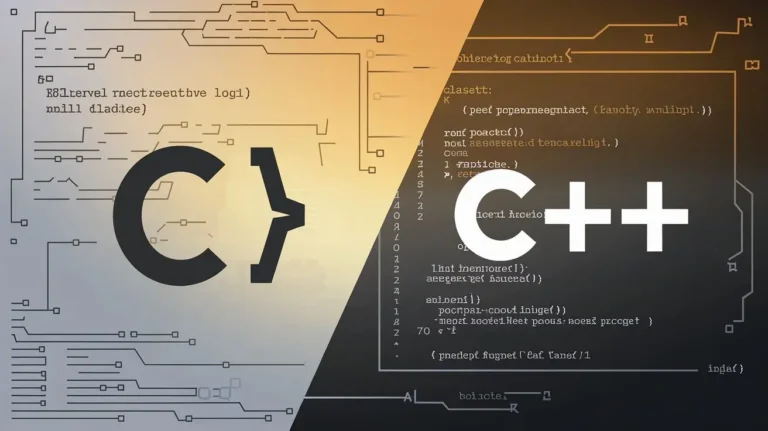When starting with programming, many beginners wonder about the difference between C and C++. These two languages have been fundamental to software development for decades. In this blog, we’ll explore their key differences in simple terms, helping you understand when and why you should use each.
📋Table of Contents
📢Introduction to C and C++
C is one of the oldest programming languages, developed in the early 1970s. It’s a procedure-oriented language, meaning it focuses on creating functions to perform tasks.
C++, developed in the 1980s, builds on C and introduces object-oriented programming (OOP). This makes it more versatile for handling larger and more complex software projects.
📌Key Differences Between C and C++
1. Programming Paradigm
| C Language | C++ Language |
| C is a procedure-oriented language. In C, you write functions that operate on data, focusing on steps or procedures to solve problems. | C++ is both procedure-oriented and object-oriented. It allows you to bundle data and functions into objects, making it easier to model real-world problems. |
2. Data Encapsulation and Abstraction
| C Language | C++ Language |
| C does not support encapsulation. All data and functions are generally available globally within the program. | C++ supports data encapsulation by using classes and objects. This helps in data abstraction, meaning you can hide complex details and expose only what is necessary. |
3. Memory Management
| C Language | C++ Language |
In C, you manually allocate and free memory using functions like malloc() and free(). | C++ provides easier memory management through constructors and destructors. It also supports the new and delete operators for dynamic memory allocation. |
4. Function Overloading
| C Language | C++ Language |
| C does not support function overloading. Each function must have a unique name. | C++ allows function overloading, meaning you can have multiple functions with the same name but different parameters. This makes the code more flexible and easier to read. |
5. Input and Output
| C Language | C++ Language |
| In C, input and output are done using standard library functions like printf() and scanf(). | C++ uses streams like cin and cout for input and output, which are more powerful and easier to use for beginners. |
📌Advantages and Disadvantages of C and C++
1. Advantages of C & C++:
| Advantages of C | Advantages of C++ |
| Simple and efficient, making it great for system-level programming. | Supports both procedural and object-oriented programming, making it more versatile. |
| Excellent for embedded systems and operating system development. | Allows code reuse through inheritance and polymorphism, reducing duplication. |
2. Disadvantages of C & C++ :
| Disadvantages of C | Disadvantages of C++ |
| Lack of object-oriented features limits flexibility for large applications. | More complex than C, especially with advanced features like multiple inheritance. |
| Manual memory management increases the risk of memory leaks and errors. | Larger programs can become harder to manage due to its complexity. |
📌When to Use C and C++
| Disadvantages of C | Disadvantages of C++ |
| Use C when you need efficient, low-level programming, such as for operating systems, device drivers, or embedded systems. | Use C++ when you are working on large-scale applications that need to model real-world entities or require flexibility and scalability, such as game development, GUI applications, or complex simulations. |
🎯Conclusion
Both C and C++ have their strengths and are suited for different types of programming tasks. C is simpler and faster for system-level programming, while C++ provides more powerful tools for building complex, maintainable applications through its object-oriented features. Understanding the difference between C and C++ will help you choose the right language for your project.
By following this guide, you should now have a clear understanding of the differences between C and C++. Whether you’re a beginner or an experienced developer, knowing when to use each language is key to efficient software development.
❓FAQs
Q1. Is C++ harder to learn than C?
Ans: C++ is more complex due to its object-oriented features, but once you grasp the basics, it can be more powerful.
Q2. Can I learn C++ without learning C?
Ans: Yes, you can start with C++ directly, as it includes all of C’s features and more.
Q3. Which is faster, C or C++?
Ans: C is generally faster for lower-level tasks, but the difference is often negligible in modern computing.
